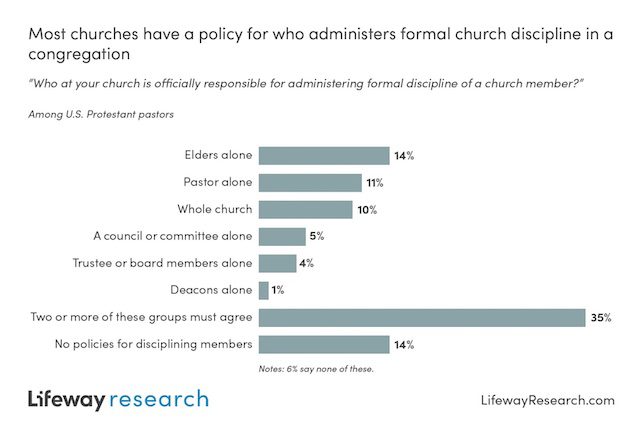“Different churches have different decision-making structures. When it comes to disciplining a member, this decision is most often implemented by more than one decision-making group within the church. This is likely driven by a desire for unity through a difficult decision,” said McConnell.

Mainline pastors are almost twice as likely as evangelical pastors to say their churches have no official discipline policies (21% v. 12%). Methodists are the most likely to say they have no such policies in their congregations (36%).
Churches with fewer than 50 in attendance are also around twice as likely as congregations with more than 100 in attendance to report no formal church discipline policies (19% v. 9%).
White pastors are the most likely to say church discipline is the responsibility of elders alone (16%), while African American pastors are among the most likely to say it falls to the pastor alone (21%).
Discipline Purpose
The Bible addresses church discipline at least twice. The long-term goal in each passage is repentance and restoration of the offending members.
In Matthew 18, Jesus lays out a process for going to an individual directly to confront wrongdoing. If that doesn’t work, Jesus says to bring additional witnesses. If that also fails, the issue should be brought before the whole church. In 1 Corinthians 5, Paul instructs the church at Corinth to confront sinful members and remove them from the congregation.
Around 4 in 5 U.S. Protestant pastors (83%) say their churches seek to lovingly and biblically confront unconfessed sin, including 51% who strongly agree. Few (14%) disagree, and 3% aren’t sure.
Evangelical pastors are more likely than mainline pastors to say this is the case in their congregations (89% v. 74%). Denominationally, Restorationist Movement (94%) and Baptist (90%) pastors are more likely than Lutheran (82%), Presbyterian/Reformed (73%) and Methodist (69%) pastors to agree their churches aim to lovingly and biblically confront unconfessed sin.
“Confronting unconfessed sin is both for the benefit of the local church and the individual,” said McConnell. “Most churches look to follow biblical guidelines in these cases.”
For more information, view the complete report.
This article originally appeared here.

